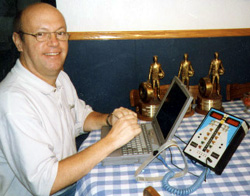
Will the small tracks even survive?
 We are all aware that real estate prices and land development is gobbling up land that nobody thought would ever be valuable. Urban sprawl and the “need” for people to get out of the city and feel like they are getting away from work is driving this movement. That is not news to any of us. What is becoming news is the value of some of the small drag strips and oval tracks across the country. A drag strip that was 15 miles from town, sitting in some low-cost farmland could now be only 3 miles from a new housing development and could possibly be the target for a golf course designer! This is NOT GOOD for us racers.
We are all aware that real estate prices and land development is gobbling up land that nobody thought would ever be valuable. Urban sprawl and the “need” for people to get out of the city and feel like they are getting away from work is driving this movement. That is not news to any of us. What is becoming news is the value of some of the small drag strips and oval tracks across the country. A drag strip that was 15 miles from town, sitting in some low-cost farmland could now be only 3 miles from a new housing development and could possibly be the target for a golf course designer! This is NOT GOOD for us racers.
The escalating value of the land might be good for the track owner as he nears retirement or looks at his hard work and the investment he has made. It might actually pay off now if he decides to sell the property.
There are track owners that have no intention to sell and it isn’t about the money. They love what they are doing and they know their customers are loyal and support their business. What will they do to SURVIVE the land developers?
That is a tough question and has a lot of possible answers. The first thing they have to deal with is how hard can they fight the progress that seems inevitable? Can they invest thousands of dollars for lawyers to fight zoning changes or annexing by city or county officials? Is the owner’s profits or personal wealth worth the battle?
A lot of the times the track owners just decide to sell and who can blame them? Battling City Hall and politicians who are in the back pocket of the land developers is futile at best.
What can be done to help the local tracks and the core of our sport survive and even grow so it is a benefit to the community?
That is a question we should all be asking ourselves. If we lose more and more local tracks and we all have to tow farther to race, eventually we will all race less. That will mean the surviving tracks will make less money and they too will become targets for developers.
Here is a short list of my suggestions on how racers can protect their tracks. (I do speak with experience on this, as I was a track owner for 12 years in Cedar Falls, IA. I sold the track because I couldn’t make enough profit to properly maintain and improve it. I was a burden to the track’s growth and I knew it. It sold to a great group of guys who have a lot of money to invest. They did major improvements and the property is much more valuable now and the track is better.)
-
Local racers need to make sure local people know the track is open and invite friends to come out and watch. Take some time and explain what is going on at a bracket race. Better yet, tell them to bring their street car and show them how to bracket race it.
-
Help get schedules posted locally. You might know a business owner who would let you tape up a track schedule but may not let a stranger do it.
-
Get local businesses involved with the track. If you know a business owner who could benefit from some local exposure tell the track manager about it. If you give the manager his name, how to reach him and tell him he can use your name as a reference to open the door it might get a new sponsor involved at the track.
-
The more local and regional support a track gets the more importance it has to the community so developers will shy away from it. No developer wants to build a new housing area next to a noisy drag strip. They want to buy the land cheap BECAUSE of the noise and then get the track closed because it is noisy and they want people to move into the houses they will build. They will plead with the city council and zoning guys to find a reason to close the track. It sounds stupid, but believe me it has worked over and over again.